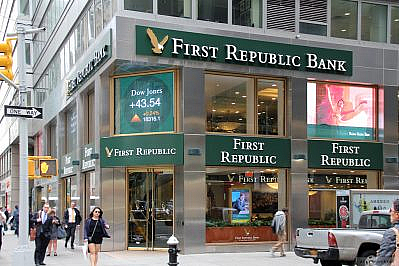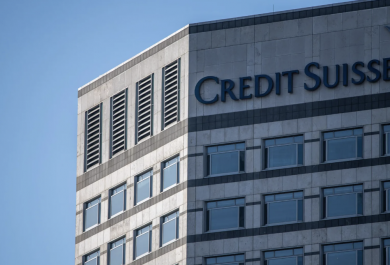First Republic bank was seized by US government regulators early Monday and sold to JPMorgan Chase. Regulators moved quickly to head off the banking crisis that’s roiled US lenders since March.
Summary
First Republic bank was seized by US government regulators early Monday and sold to JPMorgan Chase. Regulators moved quickly to head off the banking crisis that’s roiled US lenders since March.
- First Republic is the third midsize bank to fail in the last two months after the March collapses of Silicon Valley Bank and Signature Bank. First Republic is the second-largest bank failure in U.S. history after the collapse of Washington Mutual during the 2008 financial crisis.
- Last week, First Republic reported it had lost $100 billion in deposits in the first quarter of 2023 amid the banking turmoil plaguing mid-sized lenders. The disclosure launched a mass sell-off of First Republic’s shares, sending the bank into a death spiral.
- US regulators reportedly contacted six banks before JPMorgan Chase agreed to “step up,” as CEO Jamie Dimon put it, and take on $173 billion in loans, $30 billion of securities and $92 billion in deposists from First Republic.
- JPMorgan Chase will pay $10.6 billion to the Federal Deposit Insurance Corporation (FDIC) to take on most of First Republic’s assets. This will allow for an “orderly failure” of the San Francisco-based lender that avoids having the FDIC insure all of First Republic’s deposits.
- “Treasury is encouraged that this institution was resolved with the least cost to the Deposit Insurance Fund, and in a manner that protected all depositors,” a spokesperson for the Treasury Department told Reuters. “The banking system remains sound and resilient, and Americans should feel confident in the safety of their deposits and the ability of the banking system to fulfill its essential function of providing credit to businesses and families.”
- All 84 branches of First Republic were set to reopen on Monday morning as new branches of JPMorgan Chase. JPMorgan Chase and the FDIC will jointly cover the costs of losses on loans issued by First Republic, while the sale will likely cost $13 billion from the Deposit Insurance Fund run by the FDIC.
![]()
- CNN predicted the Biden administration’s political headache over the banking crisis would not end with the collapse of First Republic. “The charge that the administration is engaging in a 2008-style bailout for wealthy banking executives – even if it is not accurate – is an easy one for Biden’s political opponents to make and is complicated for the White House and the Treasury Department to refute,” wrote Stephen Collinson.
- According to NBC News, “Among medium-sized banks, First Republic was most affected by the trend” of depositors fleeing midsized banks. “As of mid-March, about 70% of its deposits were uninsured, according to Bank of America, meaning they were larger than the FDIC’s $250,000 guaranteed limit. That compares with a median of 55% uninsured deposits for medium-sized banks and the third-highest level after SVB and Signature Bank.”
- The New York Times reported the 3 banks that collapsed so far in 2023 were bigger than the 25 banks that went bust during the 2008 financial crisis. “The three banks held a total of $532 billion in assets. That’s more than the $526 billion, when adjusted for inflation, held by the 25 banks that collapsed in 2008 at the height of the global financial crisis. The implosion of Washington Mutual that year, as well as the investment banks Lehman Brothers and Bear Stearns, was followed by failures throughout the banking system.”
![]()
- The Wall Street Journal investigated why First Republic collapsed. “First Republic’s undoing was triggered by the Federal Reserve’s rapid series of interest-rate increases, which led depositors to seek better returns elsewhere. That meant it had to pay more to keep them, just when rising rates were battering the value of its mortgage portfolio. It was a problem obvious in hindsight, but First Republic, among others, thought they would survive the Fed’s inflation fighting just fine.”
- The New York Post reported, “JPMorgan was one of several interested buyers including PNC Financial Services Group, and Citizens Financial Group Inc which submitted final bids on Sunday in an auction being run by U.S. regulators, sources familiar with the matter said over the weekend.”
- According to Fox News, First Republic “was the envy of most of the industry and its clients mostly included the rich and powerful, who rarely defaulted on their loans.” However, many of its deposits were uninsured as they were above the FDIC’s $250,000 limit, leading to depositors’ collective decision to pull more than $100 billion out of the bank in March.
© Dominic Moore, 2023






